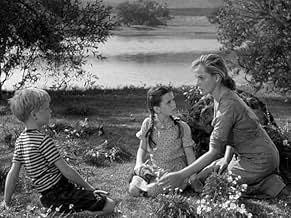IMDb RATING
7.6/10
2.4K
YOUR RATING
A Norwegian farmer lovingly raises his daughter in rural World War II-era Benson Junction, Wisconsin.A Norwegian farmer lovingly raises his daughter in rural World War II-era Benson Junction, Wisconsin.A Norwegian farmer lovingly raises his daughter in rural World War II-era Benson Junction, Wisconsin.
Abigail Adams
- Girl
- (uncredited)
Robert Anderson
- School Boy
- (uncredited)
- Director
- Writers
- All cast & crew
- Production, box office & more at IMDbPro
Storyline
Did you know
- TriviaJerry Maren, a member of the Lollipop Guild from The Wizard of Oz (1939), stood in for Margaret O'Brien in the scene where she is floating down the river in a bathtub.
- GoofsIn the opening scene, during the two-shot of Selma Jacobson and Arnold Hanson, he can be seen mouthing her lines as she says them.
- Quotes
Martinius Jacobson: [Entering Bjornson's new barn] You can still smell the new wood... finest smell on the earth.
- ConnectionsFeatured in A Night at the Movies: Merry Christmas! (2011)
- SoundtracksEntry of the Gladiators
(1897) (uncredited)
Written by Julius Fucík
In the score during the elephant sequence
Featured review
Sure, maybe the movie harkens back to a simpler time and maybe life really didn't go this way for alot of people, but this is a sweet movie- the likes we don't really see too much of these days. I did find myself waiting for the inevitable "other shoe to drop" as things were really going too well for the main characters and in all movies- something bad usually happens. I have read other comments here regarding this movie and it's supposed communist undertones- if giving of yourself to help someone that lost everything in a fire is communist- then I'm all for it. Edward G Robinson is hard working, sweet and gentle- without being mushy- it's a simple film that is nice to watch for it's wholesomeness. There are some unhappy parts- a barn burning- and a lesson that even when you get something that you have wanted for your whole life, things can be taken away in the blink of an eye. It's a wonderful movie and has alot of the things I watch some classic movies for: a charm and sweetness that involves no sex and violence- it doesn't need to to get it's message across.
- How long is Our Vines Have Tender Grapes?Powered by Alexa
Details
- Runtime1 hour 45 minutes
- Color
- Aspect ratio
- 1.37 : 1
Contribute to this page
Suggest an edit or add missing content


























